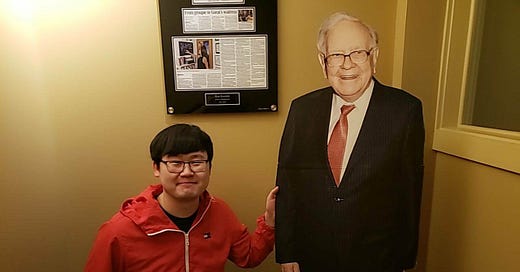Why am I going to Omaha Nebraska?
Warren Buffett, the man that has inspired me to pursue investing
*Photo taken at Gorat’s Steakhouse. Warren Buffett’s favourite steakhouse in Omaha. A must-go spot. The server was super friendly, helping me take photos in Buffett’s personal dining room with his poster. Service was 10/10.
* I had Warren Buffett’s classic order of a 22oz T-Bone steak with a side of potatoes and Coke. The steak was juicy and tender. Meal was 8.5/10.
Why am I taking a week-long trip to Omaha, Nebraska?
How did Omaha create arguably one of the best investors of our time?
How come Warren Buffett came back to Omaha despite leaving the city multiple times in his youth and early finance career?
I attended the Berkshire Hathaway annual meeting on May 6 and will be there from May 2nd to May 9th.
I hope to gather additional insight on the environment that shaped the “Oracle of Omaha.”
The purpose of this trip is to be inspired by the city, the people, and likeminded individuals that come from around the world who, I assume, have been impacted by Warren Buffett in one way or another.
I will be capturing every moment on my YouTube channel (click the link). I will upload vlogs/travel videos while I’m in Omaha. Expect videos to consistently be uploaded from the second week of May, when I’m back from my trip, to the end of May.
I had a friend tell me, “Never meet your heroes.” My reply to this is similar to my trip to Japan. I wanted to go to Japan since I was very young but never got the opportunity until 2019, when I could afford to pay for the entire trip by myself. I know so much about the temperament of Japanese people, their culture, and the various forms of entertainment that when I got to Japan, everything was consistent, if not better than I had expected. Some people ask me why I love Japan so much, and the simple answer is that Japan fits my temperament. Similar to Japan, although I have not met Buffett himself, from reading his biographies, investment books, and annual reports; listening to almost every annual meeting, and monitoring his every move, I believe I understand his temperament well enough that if I got the chance to interact with him, I would cherish every moment. The way Buffett conducts his life is consistent with my temperament. Furthermore, I believe I would be incredibly lucky to even get a picture with Buffett, let alone say a couple words to him.
I just want to see the GOAT in real life. Not by imagining who he is from books or watching him in videos; my life has been dedicated to the art and science of investing, and I need to see the man in person before the inevitable happens. I would truly regret not taking the time to see my idol while he is alive and well.
Second on that list is former 3-Michelin-starred master sushi chef Jiro Ono, from Jiro’s Dream of Sushi. The reason why the restaurant “Sukiyabashi Jiro” was stripped of its 3-Michelin stars is because it is no longer open to the public and caters to mainly local customers. Sadly, they don’t take reservations from foreigners anymore due to the number of no-shows. It is incredibly disheartening that a couple of bad apples ruined it for the rest of us. It takes a lot of time to prepare an edomae sushi course, and for people to not show up is not only disrespectful to the sushi chef but also a further disservice to the valuable ingredients that are becoming increasingly rare to find. Hence, I understand why such a policy was put in place.
The reason Jiro Ono is second on that list is because he and Warren share a few common traits.
They are incredibly consistent. Warren (92 years old) and Jiro (97) both, at over 90 years of age, still go to work almost every day. Warren “tap dances to work.” Warren at least relaxes by playing bridge, a card game. Jiro, from what I am aware, looks forward to only working. In the documentary “Jiro’s Dream of Sushi,” it was mentioned that besides funerals and major holidays, Jiro goes to work. Once, there was a funeral in the afternoon, and Jiro came back to work in the evening. They both demonstrate consistency in practicing their craft.
They are both continuously learning and innovating. Many people see Jiro as the epitome of perfection, but Jiro strives for perfection but knows he will never achieve it. He is constantly learning and looking for techniques and ways to improve the taste of his sushi. In an interview with René Redzepi of Noma, a chef of chefs who has won “Best Restaurant in the World” asked, “How does he (Jiro) balance tradition and innovation? Does he feel at all that innovation is important? In response, Jiro said, “Innovation is good if what it creates is tastier than what existed before. If it looks good but the taste is degraded, it won’t endure. If you are doing something new, it has to be an improvement on what came before.” People thought octopus (tako) was rubbery and not tasty. Jiro created a technique where you have to massage the octopus for 40 minutes. This allowed the octopus to no longer taste rubbery, resulting in customers requesting additional pieces of octopus nigiri. Buffett surprised the world by investing in Apple, which is a consumer technology company outside of Buffett’s typical circle of competence. Buffett, at his old age, was able to change his mind about Apple and adopt it into his circle of competence. Adopting Jiro’s answer to investing, one should adopt a new investing technique if it produces higher returns or generates more alpha. If the investment method fails to generate higher returns, although it sounds cool and impressive due to its complexity of implementation, ultimately it will not endure. It should also be noted that although both masters are open to new ideas, it takes them a long time to adopt new ideas into their standard practice. Their prudence in acquiring new ideas and their success in implementing new ideas are what sets them apart.
Focus. Bill Gates and Warren Buffett were both asked to write on a piece of paper one word that made them successful. When they were asked to simultaneously open their piece of paper, it read “Focus.” It was a common criticism in the Buffett household that, although Warren Buffett was there, he wasn’t present. Buffett would come back from work, eat dinner, and go back to his office to read about stocks. His mind was always on stocks. Even on vacations, Warren would bring annual reports with him to read. When Susan Buffett, Warren’s wife, had to throw up and asked Warren for help, Warren went to the kitchen and got a colander. Warren was thinking about stocks or reading all the time. His justification was that this was the edge he had over his competitors. Everyone is given the same amount of public information. The person who consumes the most and interprets the data the most accurately will have an edge. Back to Jiro, the reason the documentary is called “Jiro’s Dream of Sushi” is because even in his dreams, Jiro is thinking about sushi and new ideas. I can tell that for Buffett and Jiro, they both found their calling in life, and that has undoubtedly led to levels of focus that can only be justified with passion and obsession.
So why have I decided to dedicate my life to the art and science of investing?
A mental model Charlie Munger uses is to invert a question. A mental model is an idea or concept that can be extracted from any field and applied to decision making. To decide what you want to dedicate your life to, based on the 3 common traits I identified in Jiro and Warren, what is something I would NOT do for the rest of my life? For things that don’t meet the bar, the answer to any of these 3 questions is usually "no.”
Am I willing to spend as many waking hours of my life on this? Would I be willing to consistently practice this for the rest of my life?
Would I look forward to honing my craft through continuous learning and innovation?
Is this something I can see myself focusing on for extended periods of time? Would I lose track of time when I’m working on this?
Bonus question: If I could live until 90+, do I see myself doing this until then?
Throughout my life, I have been very self-aware of what I don’t enjoy doing or where my weaknesses lie. My answer is “no” to the following:
-Anything science-related, as I self-admittedly was never that absorbed by sciences, hence I never performed that well in chemistry (B+).
-Any field requiring massive amounts of brute-force memorization. I admire lawyers who are able to recite case law or doctors who memorize the symptoms of different illnesses. My brain works best at drawing connections and linking cause-and-effect relationships. Hence, for finance or any strategy game, even if I can’t remember something off the top of my head initially, I’m able to rationalize how to get from point a to point b to arrive at the answer, so brute force memorization isn’t really needed.
-Any kind of grunt work that is purely repetitive and not engaging. I would not be able to flip burgers all day. I respect those jobs, but they're simply not for me. In investing, you are constantly looking at new companies and businesses. You are constantly learning. You look at one business and compare it to another. You can zoom in, bottom-up, and zoom out, top-down. Investing is a never-ending journey of learning and knowledge accumulation.
-Any sales job where the product or service I am selling I don’t personally see the value in. My first job was selling cellphones at an electronics store called “The Source” in Canada. I only sold cellphones that I believed would last the customer at least 2 years. Sometimes, the company would have promotions for phones that would be obsolete in 1 year or were already obsolete; I would never promote those despite their higher commission rates. This would make me a horrible car salesman if the lot was filled with lemons.
The reason I am dedicating myself to becoming the best investor I can be is because my answer to all four questions is a resounding “Yes.”
One reason I want to go to Omaha is to see the epitome of investing excellence. Warren lives the life I envision for myself, with the exception of some creature comforts.
Apply the framework and the 4 questions to what you’re pursuing now. If you are a student and are comparing options, see if this helps bring clarity to your career aspirations. The economic reality is that most people won’t have the luxury to pursue what is truly meaningful to them, and there is nothing wrong with that. Everyone’s life is different, and sometimes life’s struggles and complexities get in the way of following the path you truly want. It could also be the case that you simply have not decided what to dedicate your life to. In that case, invert! Look at what fields are a “no” for you and narrow from there.
If you find this post valuable and believe it might resonate with someone in your circle, please share the link below. I'm grateful for your support in spreading the word, as it helps me reach new audiences and grow organically. Thank you for being part of this journey!
Follow me on any social media platform you use: https://linktr.ee/continuouscompounding






